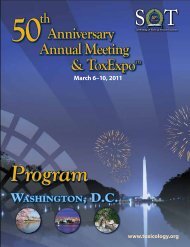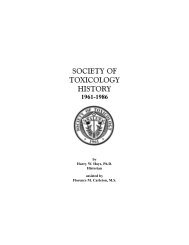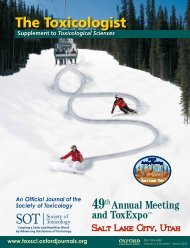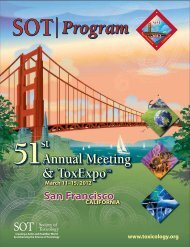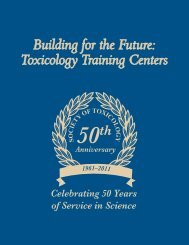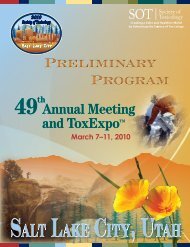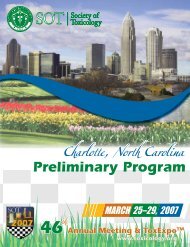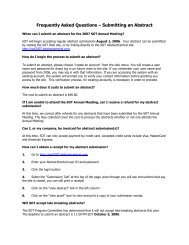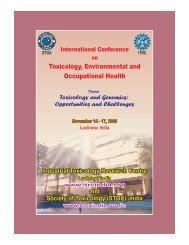51st Annual Meeting & ToxExpo - Society of Toxicology
51st Annual Meeting & ToxExpo - Society of Toxicology
51st Annual Meeting & ToxExpo - Society of Toxicology
Create successful ePaper yourself
Turn your PDF publications into a flip-book with our unique Google optimized e-Paper software.
<strong>Society</strong> <strong>of</strong> <strong>Toxicology</strong> 2012<br />
Scientific<br />
Workshops<br />
The Thematic Track information can be found on pages 8–9.<br />
have led to increased food quantity and quality, but as a consequence<br />
have also led to concerns about food safety and potential risks to<br />
public health. These global food safety concerns range from incidental<br />
or deliberate food contamination from micro-organisms or<br />
toxic substances, chemicals migrating into food from food containers,<br />
pesticide residues on food, and genetically modified foods. Our panel<br />
<strong>of</strong> experts will highlight the science-based approaches being used to<br />
regulate food safety in the food, chemical, and agricultural industries<br />
across the world. To underscore the important <strong>of</strong> these issues, we will<br />
identify opportunities for advancing technologies and science across<br />
many sectors including academia, industry, government, and public<br />
health organizations, to build confidence in the safety <strong>of</strong> our food to<br />
protect human health.<br />
• New Approaches to Assessing Safety/Risk <strong>of</strong> Chemical<br />
Contaminants in Food. Angelika Tritscher, World Health<br />
Organization, Geneva, Switzerland.<br />
• Evaluating the Safety <strong>of</strong> Materials Used in Food Contact<br />
Materials. Daniel Wilson, The Dow Chemical Company,<br />
Midland, MI.<br />
• Advances in Safety/Risk Assessments <strong>of</strong> Pesticide Residues on<br />
Foods. Alan Boobis, Imperial College, London, United Kingdom.<br />
• Regulating the Safety <strong>of</strong> Foods and Feeds Derived from<br />
Genetically Modified Crops. Bruce Chassy, University <strong>of</strong> Illinois,<br />
Urbana, IL.<br />
• Risk Assessment and Management Options for Chemical<br />
Contaminants in a Global Food Supply. Clark Carrington,<br />
US FDA, College Park, MD.<br />
Characterizing Toxic Modes <strong>of</strong> Action<br />
and Pathways to Toxicity<br />
Discovering Novel Hypotheses for Mechanisms <strong>of</strong><br />
Toxicity from High-Content Data Sets<br />
Wednesday, March 14, 1:30 PM to 4:15 PM<br />
Chairperson(s): Nigel Greene, Pfizer, Inc., Groton, CT, and Ahmed<br />
Enayetallah, Pfizer, Inc., Groton, CT.<br />
Sponsor:<br />
Biological Modeling Specialty Section<br />
Endorsed by:<br />
Molecular Biology Specialty Section<br />
For over a decade researchers have sought to apply technologies such<br />
as genomics, proteomics, and metabolomics to either predict toxicity<br />
through the use <strong>of</strong> gene, protein, or metabolite signatures or to further<br />
understand modes <strong>of</strong> action in toxicity through chemical exposure.<br />
There have been some success stories in recent years but largely these<br />
technologies have not lived up to the promises made when they were<br />
first developed. The complex nature <strong>of</strong> biological systems and the<br />
multivariate nature <strong>of</strong> a system’s response to a xenobiotic have made<br />
it difficult to pick apart the true causes <strong>of</strong> the phenotypic changes that<br />
are observed. In addition, the explosion <strong>of</strong> data available in the public<br />
domain has made it difficult for the human brain to keep up with<br />
current knowledge and apply this effectively to a set <strong>of</strong> experimental<br />
readouts to determine cause and effect relationships. Xenobiotics<br />
<strong>of</strong>ten induce their biological effects via interactions with one or<br />
more biological targets, thus triggering whole cascades <strong>of</strong> events that<br />
culminate in adverse events in humans. Understanding the nature<br />
<strong>of</strong> these events, coupled with consideration <strong>of</strong> their relevance to the<br />
human mode <strong>of</strong> action and target context, will improve the scientific<br />
basis and thus increase the accuracy <strong>of</strong> risk and safety assessments.<br />
In addition, better understanding <strong>of</strong> toxicological modes <strong>of</strong> action<br />
will ultimately lead to the development <strong>of</strong> more predictive models<br />
<strong>of</strong> in vivo biological responses. Where these take the form <strong>of</strong> in vitro<br />
biochemical and cell-based assays it will lead to the reduction <strong>of</strong> the<br />
use <strong>of</strong> animals in laboratory experiments. This session will outline<br />
some <strong>of</strong> the cutting–edge research and methodologies for distilling<br />
down the vast array <strong>of</strong> public information into more manageable<br />
sets <strong>of</strong> knowledge and relationships. We will discuss novel in silico<br />
approaches to mine these relationships and formulate hypotheses for<br />
modes <strong>of</strong> action <strong>of</strong> the compound or biological target under study and<br />
present some applications <strong>of</strong> these methods in understanding toxicological<br />
mechanisms.<br />
• Predicting Mechanisms <strong>of</strong> Chemical Toxicity Using the<br />
Comparative Toxicogenomics Database (CTD). Carolyn<br />
Mattingly, The Mount Desert Island Biological Laboratory,<br />
Salisbury Cove, ME.<br />
• A Novel Computational Approach for Early Prediction <strong>of</strong><br />
Target-Based Toxicity through Downstream Molecular Causal<br />
Reasoning. Daphna Laifenfeld, Selventa, Inc., Cambridge, MA.<br />
• Toxicity Biological Networks Using Causal Reasoning to<br />
Leverage High-Throughput Quantitative SILAC Proteomics.<br />
Ahmed Enayetallah, Pfizer, Inc., Groton, CT.<br />
• Identifying Mechanisms <strong>of</strong> Drug-Induced Toxicity Using<br />
Metabolomics. David F. Grant, University <strong>of</strong> Connecticut,<br />
Storrs, CT.<br />
Thematic Session<br />
96<br />
SOT’s 51 st <strong>Annual</strong> <strong>Meeting</strong>



